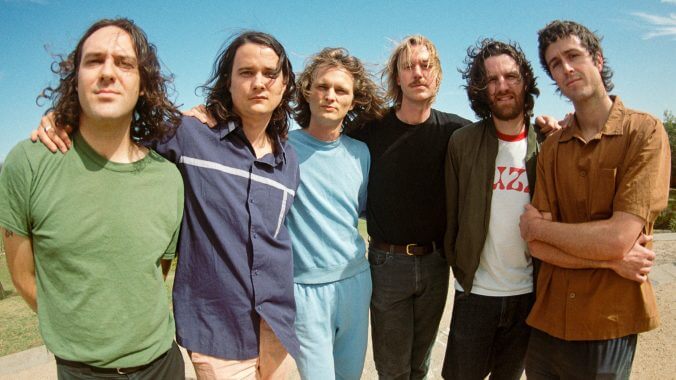The Boundless, Expanding Universe of King Gizzard and the Lizard Wizard
Guitarist Joey Walker discusses the band’s embrace of synths on The Silver Cord, looking back on their legacy and never playing the same show twice.
Photo by Jason Galea
King Gizzard and the Lizard Wizard are a relentlessly creative force. Since the Australian group made their debut in 2012 with 12 Bar Bruise, they’ve averaged a little over one new album every six months—not counting their live albums, EPs, and other miscellanea. If you played their catalog back to back in chronological order, you’d probably start hallucinating from sleep deprivation somewhere around last year’s Omnium Gatherum. They’ve conquered garage rock, psychedelia, krautrock, folk, heavy metal, prog and just about every space in-between on their vastly expanding spectrum of sound. But even King Gizzard recognize their limits. “We probably wouldn’t do a modern ska album,” says guitarist Joey Walker over a Zoom call from his home in Melbourne. “There’s been some exploration into doing some hip-hop stuff, and we’re very conscious of how we’re doing that—since we’re a band that makes heavy rock music. Just because we can do something doesn’t necessarily mean that we should.”
The band’s new album, The Silver Cord, once again finds Walker, Stu Mackenzie, Cook Craig, Lucas Harwood, Michael Cavanagh and Ambrose Kenny-Smith continuing to explore sonic terrain beyond the tried-and-true familiarity of guitar rock. Throughout The Silver Cord, the sextet builds epic, side-long space-disco soundscapes from analog synthesizers. Yet, while the tonal palette is cohesive and consistent, the styles they explore are characteristically all over the map—from the extended odyssey of 20-minute synth-pop opener “Theia” to the hypnotic disco pulse of “Set.” “Gilgamesh” even takes on an early ‘90s hip-house sound in the vein of The KLF’s “America: What Time is Love?,” while a variety of other unexpected influences show up throughout the album, from disco auteur Giorgio Moroder to cult Afrobeat icon William Onyeabor. The band likewise took the unusual move of releasing The Silver Cord in two formats: a single-LP release with edited, more radio-friendly versions of each song and a double-album, in which each track is given the luxury of an extended runway from which to fully take off.
The Silver Cord is also intended as a companion album to their other full-length release from 2023, the heavy metal influenced Petrodragonic Apocalypse (the “Petro album,” as Walker refers to it), with each of its seven songs corresponding to another song on its predecessor. As the band preps the album for live performances, they plan to have songs from the two albums bleed into each other seamlessly. But the progressive, semi-self-referential synth odyssey that the album turned out to be is still a few degrees off from Walker’s initial idea for where the band could go next. “I dabble in the dance world and produce music under a different alias,” Walker says. “So I was like, ‘Let’s make a dance album—a club album—that would be sick!’ And it ended up not being that, and never could be. The conventions or the template of dance music, the guys aren’t really familiar with, so it could never be that. And that’s what was brilliant about it. There was a naivety about it that everyone brought to the picture, using synths and shit, that justified the album.”
The Silver Cord also represents a new milestone for King Gizzard and the Lizard Wizard: It’s their 25th album. The group seems to only grow more productive and creatively fertile as they continue on and, just last year, they unloaded five full-length records on listeners—which is the second time they’ve done so. To those outside the band and its obsessive legions of fans, the relentless volume of material can feel perhaps like a novelty, but there’s no denying how much fun the band seems to have doing it or, for that matter, the confidence and curiosity that goes into their continued expansion and growth together.
By the time they released 2014’s I’m in Your Mind Fuzz, the group had already begun to cultivate a steady buzz and were capturing the attention of critics, but it was around the release of 2016’s Nonagon Infinity, the band’s eighth album, that Walker says is where King Gizzard’s ideas and creative stride really began to take off. “That was, maybe, the first record where it felt like uniquely Gizzard, the tenet of what we were and could be started to establish itself,” he says. “And if Nonagon was the album that sparked that for us—that period in 2017 where we did the five albums and we were just running with it, not adhering to industry norms about frequency of albums or how long they should be—that’s when we said ‘This is our tip.’”
-

-

-

-

-

-

-

-

-

-

-

-

-

-

-

-

-

-

-

-

-

-

-

-

-

-

-

-

-

-

-

-

-

-

-

-

-

-

-

-








































